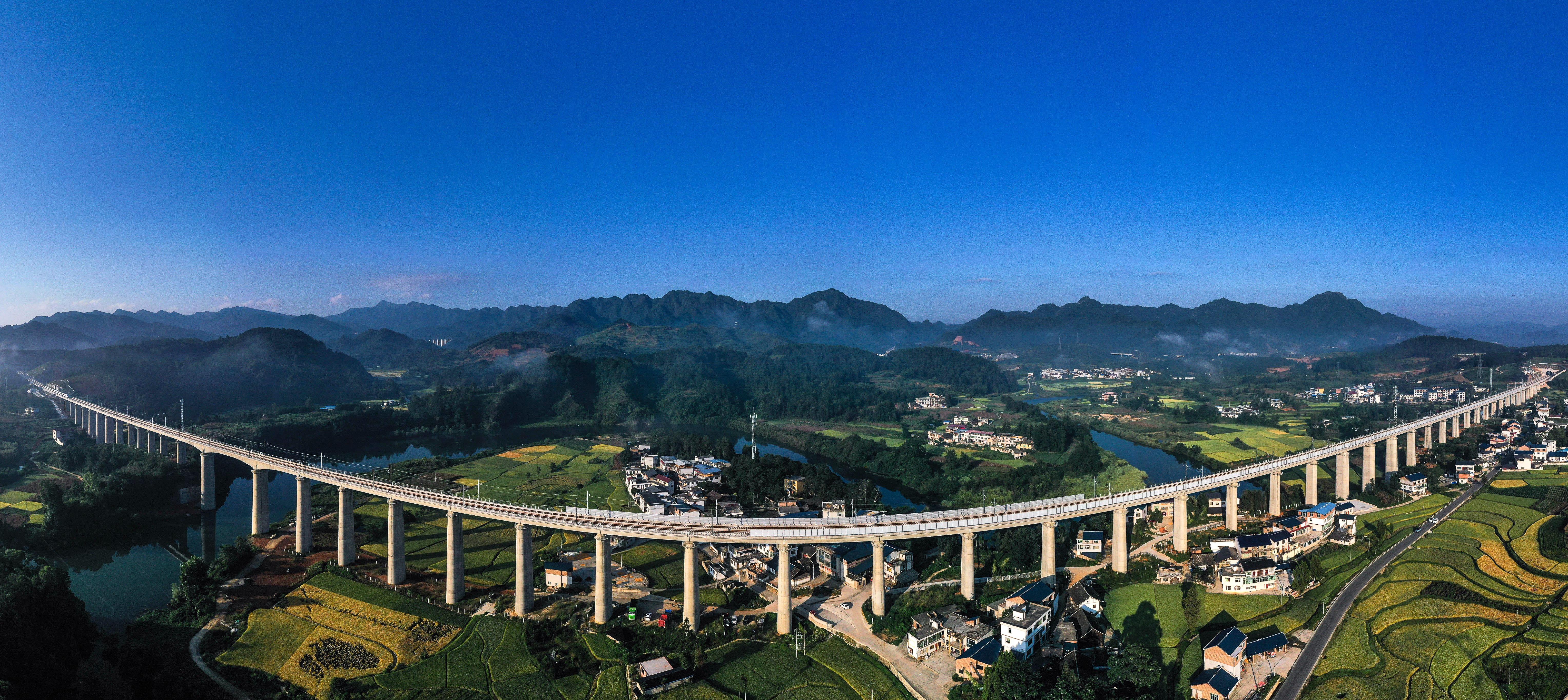 A viaduct along the Guiyang-Nanning High-Speed Railway is seen in Duyun, Guizhou province, on Thursday as the 482-kilometer railway, connecting Guizhou's capital of Guiyang and Nanning, the capital of the Guangxi Zhuang autonomous region, launched full-scale service. (PHOTO / XINHUA)
A viaduct along the Guiyang-Nanning High-Speed Railway is seen in Duyun, Guizhou province, on Thursday as the 482-kilometer railway, connecting Guizhou's capital of Guiyang and Nanning, the capital of the Guangxi Zhuang autonomous region, launched full-scale service. (PHOTO / XINHUA)
A Fuxing bullet train departed on Thursday morning from Nanning, the capital of South China's Guangxi Zhuang autonomous region, marking the launch of full-scale high-speed railway service in southwestern China's karst regions.
The 482-kilometer railway, which connects Nanning with Guiyang, the capital of Southwest China's Guizhou province, is designed to facilitate a top speed of 350 kilometers per hour and will reduce travel time between the two cities by more than two hours.
The Guiyang-Nanning High-Speed Railway runs through karst terrain in Guizhou and Guangxi, which is characterized by caves, sinkholes, cliffs and steep-sided hills.
The new railway has 13 stations — seven in the Guangxi section and six in the Guizhou section. As a major transportation artery in southern and southwestern China, it will facilitate movement of people and boost regional socioeconomic growth, according to China State Railway Group, the national railway operator.
Construction of the railway, which started in December 2017, was a challenge for its architects and engineers because its planned alignment included areas with different topographical features, including mountains, valleys and rivers. The railway comprises 199 bridges and 107 tunnels, which cover more than 90 percent of the route.
The new railway also passes through more than 30 ethnic settlements, including the Maonan, Yao and Bouyei, and is expected to boost tourism development, promote rural vitalization and facilitate high-quality development of areas inhabited by ethnic groups, according to the company.
The operator has planned three types of service schedules for weekdays, weekends and peak travel seasons. A maximum of 56 trains will be operated daily during peak seasons, it said.
 Folk artists sing on Thursday onboard a Fuxing bullet train, running between Nanning and Guiyang. (PHOTO / XINHUA)
Folk artists sing on Thursday onboard a Fuxing bullet train, running between Nanning and Guiyang. (PHOTO / XINHUA)
The new line, which also connects with the Shanghai-Kunming High-Speed Railway, Chengdu-Guiyang High-Speed Railway and Guiyang-Guangzhou High-Speed Railway, is a major step forward in improving the high-speed railway network in China.
A section of the Guiyang-Nanning High-Speed Railway — between Guiyang and Libo county in Guizhou — started operation on Aug 8, and has been recording heavy passenger traffic.
"The local travel season started at the end of June. From June 30 to Aug 7, the average daily number of travelers was about 40,000. After the new line opened, we have been seeing an additional 30,000 tourists every day," said Qin Shijing, a tour guide at Xiaoqikong, a scenic spot in Libo. "The tickets sold out quickly (after the line opened)," she added.
Wei Liuyan, an artist from Hechi, Guangxi, and inheritor of Liu Sanjie folk songs, said she sings for passengers onboard trains to express her joy over the opening of the new railway.
"Earlier, there was no direct high-speed railway link between Hechi and Nanning, and it took us about four hours by bus, which was very inconvenient. Now, I can reach my hometown in an hour," Wei said.
With the opening of the new railway, four stations were constructed in Hechi, including one in Du'an Yao autonomous county and another in Huanjiang Maonan autonomous county.
Meng Liuping, a Yao woman from Du'an, said: "The travel time between the two counties has been reduced from three hours to half an hour. We can visit our relatives and friends more often. The opening of the railway makes us very happy.... I think the railway will also boost tourism in my hometown."
Wu Zhanbo, an environmental engineer with China Railway Eryuan Engineering Group, said the Guiyang-Nanning High-Speed Railway incorporates the concept of ecological protection in its design, construction and operation, thus creating a green railway in southwestern China.
Wu said there are more than 40 ecologically sensitive areas along the railway route. "We made sincere efforts to protect them during construction work. ... Long tunnels and bridges were built to mitigate the impact on the environment."
Shang Zhen and Quan Zhanfu in Guizhou contributed to this story.
Contact the writers at luowangshu@chinadaily.com.cn


